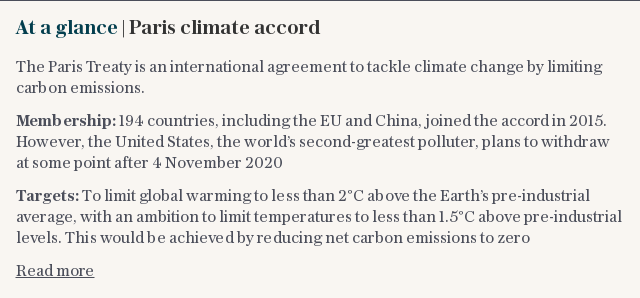White House rejects U-turn on Paris climate accord as EU official suggests softening of Trump's stance
The White House has rejected a claim from an EU official that the US has softened its stance on withdrawing from the Paris climate accord.
Donald Trump shocked the world in June when he announced he would pull the United State from the accord.
But at a Montreal summit of 30 countries seeking headway on the agreement, a US envoy reportedly signalled a softening in the US President's stance on the deal.
“The US has stated that they will not renegotiate the Paris accord, but they will try to review the terms on which they could be engaged under this agreement,” European Commissioner for Climate Action and Energy Miguel Arias Cañete said.

According to an official at Saturday’s gathering, White House senior adviser Everett Eissenstat unveiled the US plan, the Wall Street Journal reported.
Mr Canete, the European Union's top climate official, said there would be a meeting on the sidelines of next week's UN General Assembly with American representatives "to assess what is the real US position," but noted "it's a message which is quite different to the one we heard from President Trump in the past."
The actual withdrawal time from the pact is three years, allowing time for a US re-think.
However, the White House insisted there was no change in its position.
"There has been no change in the United States' position on the Paris agreement," White House spokeswoman Sarah Huckabee Sanders said.
"As the president has made abundantly clear, the United States is withdrawing unless we can re-enter on terms that are more favourable to our country," she said.
The US is expected to significantly reduce its ambition to curb greenhouse-gas emissions, which would be in line with Mr Trump’s goal of clinching “fairer terms,” the official told the Journal.
Nearly 200 countries agreed in Paris in December 2015 to curb carbon dioxide emissions with the aim of limiting the rise in average global temperatures to 1.5 degrees Celsius by 2050, compared to preindustrial levels.
When Mr Trump decided in June to withdraw the United States from the accord, Canada, China and the European Union immediately reaffirmed their respective commitments to the pact, which the Group of 20 declared "irreversible" the following month.
Called by Canada, China and the European Union, Saturday's summit took place 30 years to the day after the signing of the Montreal Protocol on protecting the ozone layer - which Canada's environment minister hailed as a multilateral "success story" by governments, NGOs and ordinary citizens jointly tackling a major global threat.
"We have an opportunity to accomplish even more with the Paris agreement," Catherine McKenna said at the summit, attended by more than half the G20 members as well as some of the nations most vulnerable to climate change - from the low-lying Marshall Islands and Maldives to impoverished Mali and Ethiopia.
"Changes are real, extreme weather events are more frequent, more powerful and more distressful," she told the gathering, pointing at the devastation wrought by mega-storms such as Harvey and Irma which many climate scientists believe are boosted by global warming.

